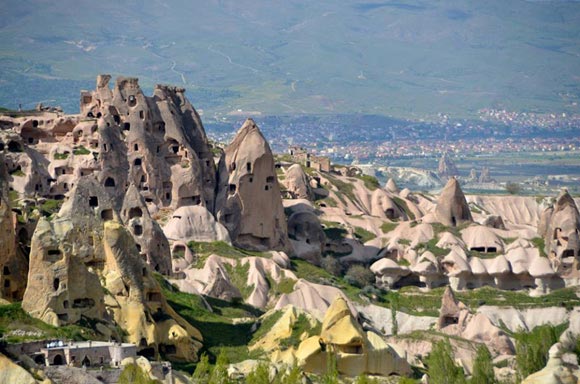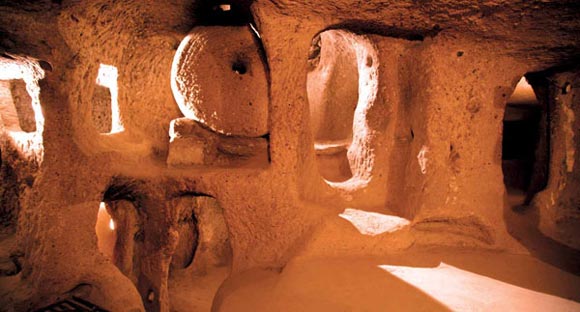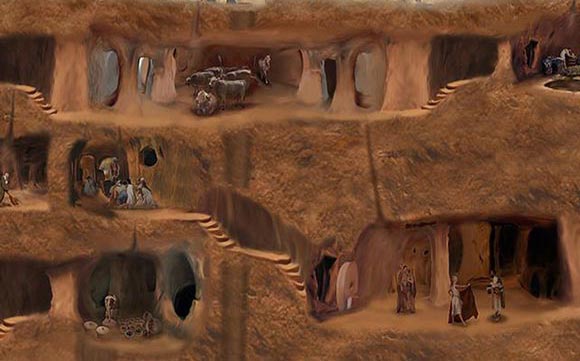
November 13, 2013
I’m not tired. Only a dead man is tired.
Give me the power to carry on your work.
Can the dead praise you?
No way; but the living soul, yes, I.
Life is too short, why should you look back?
Because if you look back, you lose track.
—Majek Fashek1
We all sometimes get tired of the fight when things get rough and tough, but how can we break out of that downward spiral, I wondered?
During a recent trip to Cappadocia, Turkey,2 a friend of mine played the song “I’m Not Tired,” which shed some light on the subject and helped me to make some connections with experiences I had while there. I was struck by the contrast between those who tend to give up easily and the resilient people that once inhabited this land.

Anyone who goes to Cappadocia will tell you what a fantastical otherworldly place it is. Volcanic formations rise in giant spires and twist into far-fetched sculptured shapes. Rivers flow through deep canyons overlooked by 400 churches chiseled out of the surrounding hills. This area has been home to various peoples for millennia, beginning with the ancient Hittites. Perhaps the most noticeable is the presence of the Christians who lived in communities there for many years.
We visited one of the largest of the 40 underground cities there, which was used by the early Christians of the first three centuries to escape Roman persecution and later Arab raiders. It housed 10,000 people at times. This city is a feat of engineering—eight levels with communal kitchens, meeting rooms, ventilation shafts, wells, granaries, bedrooms, wineries, and even stables for horses.

Watchers on surrounding hills could warn of invaders by flashing the sunlight off of mirrors to send a message on to the next post. In underground tunnels, huge circular stone slabs could be rolled and locked into place to protect them from invaders. Holes were strategically placed to drop boiling oil or arrows on attackers. This was a hard-working cooperative community with a vibrant faith life—they had to be to survive.

Besides being a place of wonder, it is also a place for reflection. It is a prime example of showing an indomitable spirit in the face of persecution. The early Christians were not ones to give up because they were hunted and jailed, tried and executed. It would have been easy for them to just surrender and say, “We’re tired of fleeing the wrath of Rome. We’ll just blend back into society and give up our faith. It’s too hard to carry on.” Instead, many of them fled to this area in Cappadocia, where they not only survived but prospered. They even started a missionary school that sent teachers to many far-flung fields.
One of the leaders there, Basil, had this to say: “Troubles are usually brooms and shovels that smooth the road to a good man’s fortune; and many a man curses the rain that falls upon his head, and knows not that it brings abundance to drive away hunger.” Basil and this community knew about hunger and famine as well. They survived by helping each other in time of need. I read his advice on one of the plaques: “If there is a famine, give half of your piece of bread and trust the Lord for the rest—both for you and them.”
The legacy of these early Christians still lives on. We saw thousands of tourists from many lands viewing the churches and learning how the Christians lived and worshipped, each of them with tour guides giving a narration in their native tongue. There were portions of murals painted on the walls with various Bible stories. It reminded me of the verses in Acts chapter 2 where those from “every nation under heaven” heard the “wonderful works of God”3 in their own tongue. Sometimes God speaks through the universal language of art and place. I saw a lady from Japan, a land that also once violently persecuted Christians, stop to pray in one of the churches that we visited.
As we sat in a small church with stone-carved seats, with a mural of Christ at the resurrection, we enjoyed the great acoustics and sang hymns and quoted verses we had memorized from the book of John chapter 1. “In the beginning was the Word, and the Word was with God, and the Word was God.”4 Those who once worshipped here probably quoted the same verses two thousand years ago, which brought me to think that each generation has to have its faith renewed. Faith cannot be contained or perfectly preserved in churches carved in stone or murals painted on walls, which are bound to deteriorate. It must be vibrant and growing in our hearts today. Jesus reminded us that “Heaven and earth will pass away, but My words will by no means pass away.”5 He told the woman at the well that it was not the place of worship that was important but the way in which we worship Him—in spirit and truth.6
It’s easy to want to give up the struggle and stop swimming when the waters rise about us. I have read stories of those who were near drowning, who heard an audible voice tempting them to stop struggling and just let the water in, right before they were rescued. If they had yielded to the “easy way out,” they wouldn’t have survived. Instead they resisted and fought on and lived to tell the tale and strengthen others’ faith as well.
Perhaps this would be a good place to end with a prayer: “Lord, I don’t want to be tired, retire, or fall into the mire of lethargy that will take me nowhere fast. Give me the strength and inspiration to keep fighting to keep my faith alive. As You said, ‘If we have faith as a grain of mustard seed, we can move a mountain’7—or live in it, if we have to. Please, give us that faith as well as our daily bread. Forgive us our mistakes, as we forgive others, and lead us away from the temptation to give up. You are all that matters, for Yours is the kingdom and the power and the glory forever.”
Forever is a long time, but it begins today by not giving up and by leaning on His strength to make it. “I can do all things through Christ who strengthens me.”8 “And let us not grow weary while doing good, for in due season we shall reap if we do not lose heart.”9
1 From reggae song “I’m Not Tired” by Majek Fashek.
2 Cappadocia is a historical region in Central Anatolia, in Turkey. The name was traditionally used in Christian sources throughout history and is still widely used as an international tourism concept to define a region of exceptional natural wonders, in particular characterized by fairy chimneys and a unique historical and cultural heritage. (Excerpted from http://en.wikipedia.org/wiki/Cappadocia)
3 Acts 2:5, 11.
4 John 1:1. The verses quoted in this post are from the New King James (NKJ) Version of the Bible.
5 Luke 21:33.
6 John 4:23–24.
7 Matthew 17:20.
8 Philippians 4:13.
9 Galatians 6:9.
Copyright © 2025 The Family International